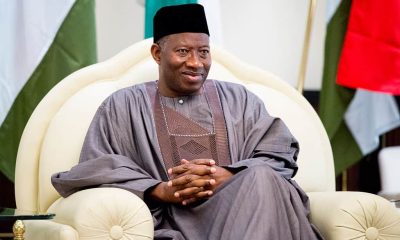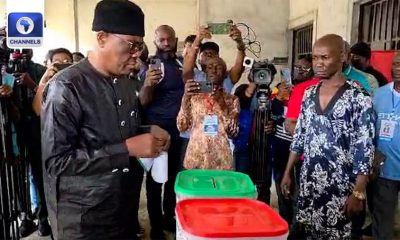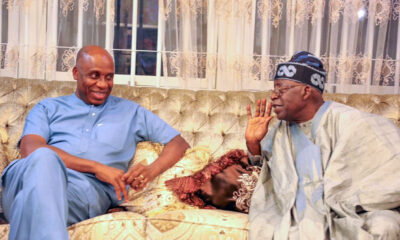Politics
Nigeria election 2023: Millions vote in tightest-ever poll
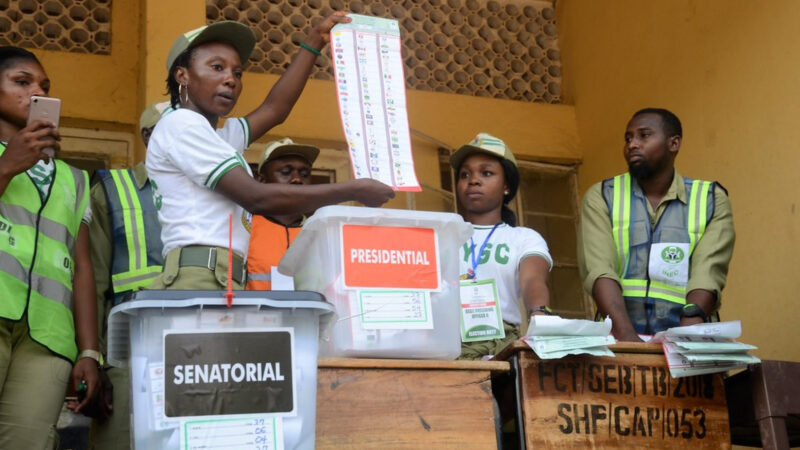
Since 1999, Africa’s most populous country has been dominated by two parties – the ruling APC and the PDP.
But this time, there is also a strong challenge from a third-party candidate – the Labour Party’s Peter Obi, who is backed by many young people.
Current President Muhammadu Buhari is stepping aside after serving two four-year terms.
His All Progressives Congress (APC) is represented by former Lagos governor Bola Tinubu, while former Vice-President Atiku Abubakar is standing for the main opposition Peoples Democratic Party (PDP). There are a total of 18 presidential candidates.
The lead-up to the polls has been overshadowed by a cash shortage caused by a botched attempt to redesign the currency, leading to widespread chaos at banks and cash machines as desperate people sought access to their money.
The new notes were introduced in order to tackle inflation, and also vote-buying. On the eve of the election a member of the House of Representatives was arrested with almost $500,000 (£419,000) in cash, and a list of people he was supposed to give it to, police say.
Whoever wins will have to deal with the currency redesign, a crumbling economy, high youth unemployment, and widespread insecurity which saw 10,000 killed last year.
After the killing of a senatorial candidate on Wednesday by suspected gunmen from the separatist group, Ipob, the parliamentary election was postponed in the south-eastern Enugu East constituency.
READ ALSO:
- UN raises alarm over hateful, divisive comments over 2023 election in Nigeria
- Election materials: Court stops INEC, MC Oluomo-led Committee deal
- Terrorists, bandits, IPOB remain a challenge to 2023 elections – IGP
- 5,000 APC, LP members join Atiku group in Abuja
The election has seen a huge interest from first-time voters and young people – a third of the 87 million eligible voters are below 35 – which may lead to a high voter turn-out than the 35% recorded in 2019.
“It is my responsibility and I have seen how important it is to vote,” 19-year-old first-time-voter Blessing Ememumodak told the BBC in Lagos.
Mr Obi, 61, is hoping to break up Nigeria’s two-party system after joining the Labour Party last May.
Although he was in the PDP before then, he is seen as a relatively fresh face and enjoys fervent support among some sections of Nigeria’s youth, especially in the south.
The wealthy businessman served as governor of the south-eastern Anambra State from 2006 to 2014. His backers, known as the “OBIdients” say he is the only candidate with integrity, but his critics argue that a vote for Obi is wasted as he is unlikely to win.
Instead, the PDP, which ruled until 2015, wants Nigerians to vote for Atiku Abubakar, 76 – the only major candidate from the country’s mainly Muslim north.
He has run for the presidency five times before – all of which he has lost. He has been dogged by accusations of corruption and cronyism, which he denies.
Most of his career has been spent in the corridors of power, having worked as a top civil servant, vice-president and a prominent businessman.
Most people consider the election a referendum on the APC, which has overseen a period of economic hardship and worsening insecurity.
Its candidate, Bola Ahmed Tinubu, 70, is credited with building Nigeria’s commercial hub Lagos, during his two terms as governor until 2007.
READ ALSO:
- INEC shifts Enugu senatorial poll to March 11
- INEC may postpone Ondo NASS poll over missing LP logo
- Buhari-Osinbajo Solidarity Front reacts to declaration of support for Atiku by ‘Osinbajo Groups’
He is known as a political godfather in the south-west region, where he wields huge influence, but like Mr Abubakar, has also been dogged by allegations of corruption over the years and poor health, both of which he denies.
Voting is expected to begin at 08:30 local time (07:30 GMT), though anyone in the queue before it ends at 14:30 will be allowed to vote.
Elections are also being held for 109 federal senators and 360 members of the house of representatives, with that for governors holding in March.
The Independent National Electoral Commission (Inec) has promised free and fair elections, and has dismissed talk of postponement amid fears of insecurity in parts of the country and the cash shortage that many feared might affect its preparations.
It is the first time Inec will conduct national elections using the Bimodal Voter Accreditation System (BVAS), a facial and fingerprints technology that is thought to improve transparency by making it harder for politicians to rig the process.
Final results have been announced on the third day after voting in the last two elections, but they may come in earlier this time because of BVAS, which also uploads vote results directly to the Inec website direct from polling stations.
A candidate needs to have the most votes and 25% of ballots cast in two-thirds of Nigeria’s 36 states to be declared the winner
If no-one achieves that, there will be a run-off within 21 days – a first in Nigeria’s history.
BBC
Politics
Osun PDP Lawmakers Endorse Tinubu for 2027, Back Adeleke Re-Election
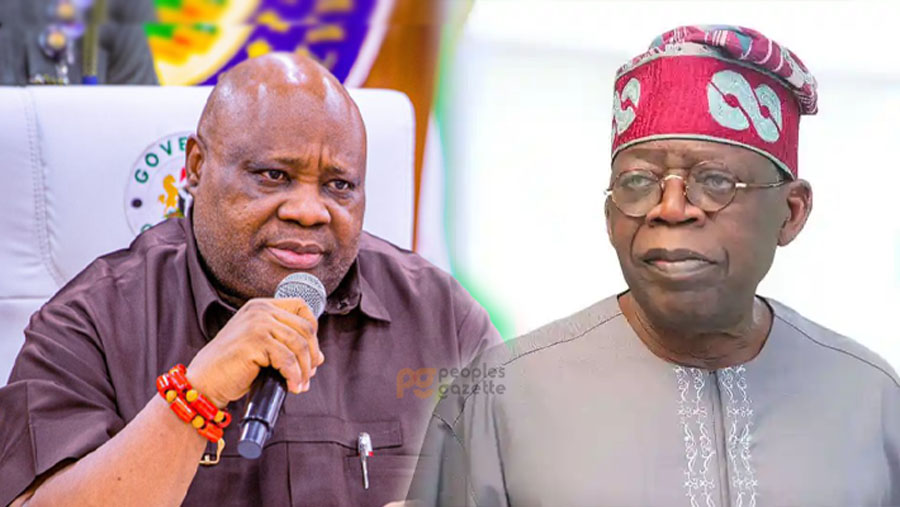
Osun PDP Lawmakers Endorse Tinubu for 2027, Back Adeleke Re-Election
Lawmakers of the Osun State House of Assembly elected on the platform of the Peoples Democratic Party (PDP) have endorsed President Bola Ahmed Tinubu for the 2027 presidential election, while also declaring their support for Governor Ademola Adeleke’s re-election bid in 2026.
The endorsement was announced at a joint meeting of the PDP lawmakers in Osogbo, where they said the decision was driven by what they described as the need for political stability, continuity in governance, and sustained development at both the state and federal levels.
Speaking on behalf of the lawmakers, the Speaker of the Osun State House of Assembly, Adewale Egbedun, said the endorsement of President Tinubu was based on his administration’s policies and interventions, which, according to them, have had a positive impact on Osun State and the South-West region.
READ ALSO:
- MACBAN Rejects Terrorism Allegations, Warns Against Stigmatisation
- Customs Seize Cocaine Worth N1bn Along Nigeria–Benin Corridor
- Security Row: El-Rufai Accuses Ribadu of Procuring Dangerous Chemicals
Egbedun noted that backing President Tinubu for a second term would strengthen federal-state collaboration, especially in the areas of infrastructure development, security, and economic reforms, while also ensuring continued federal presence in Osun.
The lawmakers also unanimously passed a vote of confidence in Governor Adeleke, citing what they described as his people-oriented leadership style, commitment to workers’ welfare, and ongoing projects across key sectors, including education, healthcare, road infrastructure, and local government development.
According to the PDP legislators, Governor Adeleke’s administration has prioritised inclusive governance, fiscal discipline, and the restoration of public confidence in government, adding that these achievements make him deserving of a second term in office.
They dismissed suggestions that endorsing President Tinubu, who belongs to a different political party, contradicts their loyalty to the PDP, arguing that the move reflects political pragmatism and the overriding interest of Osun State.
The lawmakers stressed that their decision does not weaken the PDP in Osun but rather positions the state to benefit from harmonious political alignment between the state and the federal government.
Reaffirming their commitment to the PDP, the legislators said they would continue to work for the party’s success in future elections while supporting leadership choices they believe would advance peace, stability, and development in Osun State and Nigeria at large.
Osun PDP Lawmakers Endorse Tinubu for 2027, Back Adeleke Re-Election
Politics
Ex-APC Chairman Ganduje Discusses Kano Politics, National Leadership Plans
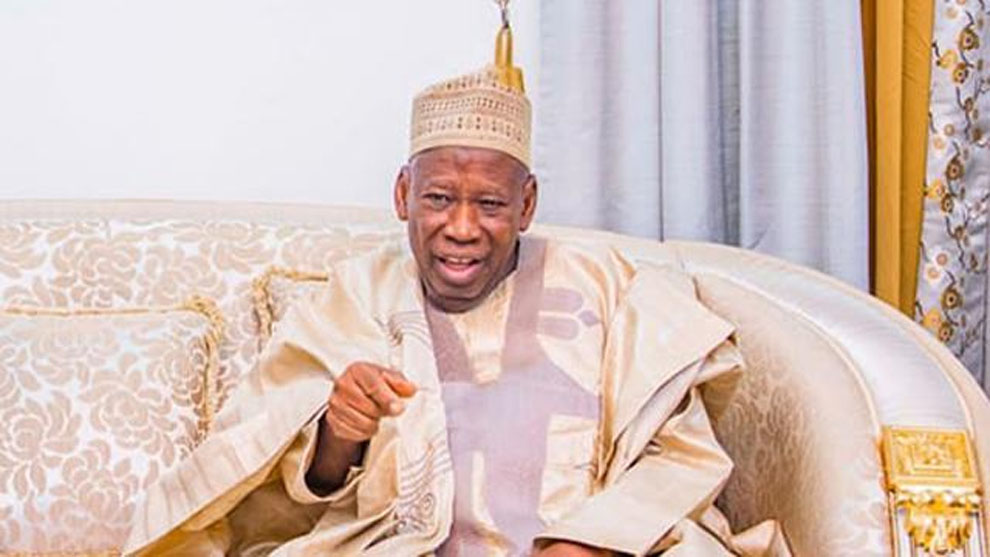
Ex-APC Chairman Ganduje Discusses Kano Politics, National Leadership Plans
Former All Progressives Congress (APC) National Chairman and ex-Kano State Governor, Abdullahi Umar Ganduje, has opened up about life after leaving office, his ongoing projects, and the future of Kano State politics in an exclusive interview.
Ganduje described life after office as less stressful but still busy, noting that he remains actively involved in party politics both in Kano and Abuja. He explained that while the pressures of leadership are gone, politics and governance never truly end. “You can’t just stop, since politics and governance never really end,” he said.
The former governor revealed that he is spending much of his time writing books to keep his mind sharp and contribute to knowledge-based politics. Among his current projects are “Abuja: Evolutionary Development of a City in Nigeria’s Capital Territory,” “Progressive Leadership and Sustainability of Democracy in Nigeria,” and “Progressive Party Ideology and Philosophical Direction.” Ganduje stressed the importance of education, research, and ideology in sustaining democracy and shaping effective governance.
READ ALSO:
- DPO Killed in Katsina Gun Duel With Bandits
- Kannywood Actress Samha Inuwa Jailed for Defacing ₦1,000 Note in Kano
- INEC May Adjust 2027 Election Dates Over Ramadan Concerns
Reflecting on his early life, Ganduje highlighted how knowledge, experience, and patience shaped his political journey. From attending primary school in a remote village to earning a PhD from the University of Ibadan, he emphasized that education and persistence were crucial in achieving his goals. His career spanned roles as local government secretary, commissioner, deputy governor, governor, and APC national chairman, providing him with extensive governance experience from the grassroots to the national level.
On Kano politics, Ganduje expressed pride that his predictions of a progressive return to APC in the state have been realized. He highlighted APC’s success in delivering the highest number of delegates and votes for President Bola Ahmed Tinubu during primaries and defeating the PDP in the general election by over 500,000 votes.
Addressing the Kwankwasiyya Movement and former governor Rabiu Musa Kwankwaso, Ganduje dismissed claims that the movement could challenge APC dominance in Kano. “The Kwankwasiyya Movement will not have any impact. Even though you see large crowds, the APC can mobilize bigger numbers if we choose,” he said, stressing that public sentiment favors APC due to concerns over the use of state resources for national ambitions by opposition leaders.
Ganduje also left the door open for political reconciliation with Kwankwaso, provided they share a common vision for the state and country. “I am ready. Politics is about interests. There are no permanent enemies or friends… What matters is what we want to achieve,” he said.
On the national stage, Ganduje addressed fears that northern Nigeria may not support President Tinubu in 2027, dismissing the notion as wrong. He emphasized that most Northerners accept the rotation of the presidency and are supportive of Tinubu completing his term. “Politics will always have noise, but the reality on the ground is different,” he added.
Ganduje’s reflections highlight the intersection of political strategy, education, and leadership experience in shaping both personal legacy and the future trajectory of Kano State and Nigerian politics.
Ex-APC Chairman Ganduje Discusses Kano Politics, National Leadership Plans
Politics
El-Rufai Says Son Bello Remains Loyal to APC Despite Criticism of Party

El-Rufai Says Son Bello Remains Loyal to APC Despite Criticism of Party
Former Kaduna State Governor, Nasir El-Rufai, has clarified that his son, Mohammed Bello El-Rufai, remains a member of the All Progressives Congress (APC) by personal conviction, even as he continues to critique the ruling party. Bello currently represents Kaduna North Federal Constituency in the House of Representatives, where he serves his constituents independently of his father’s political stance.
El-Rufai made the disclosure during an interview with the BBC Hausa Service on Thursday evening, shortly after reportedly resisting an attempted detainment by operatives of the Department of State Services (DSS) at Nnamdi Azikiwe International Airport upon his return from Egypt. The former governor, now a leading figure in the African Democratic Congress (ADC), emphasised that Bello is mature enough to chart his own political path.
READ ALSO:
- End of Weekly Shutdown: Igboho Advocates Negotiation to Resolve Kanu’s Legal Battle
- NELFUND Refutes UniAbuja Loan Diversion Claims
- NRC, Entertainers Finalise Plans for 2026 Valentine Train Ride
“My son Bello was elected under the platform of the APC and his electorate seem to be happy with the work he is doing, so since he is an adult of over 30 years, he can make his own choices. Politics is about personal preference,” El-Rufai said, explaining that his son’s continued stay in APC does not contradict his own opposition to the party.
He added that if Bello chooses to remain within the APC without engaging in any of the party’s perceived wrongdoing, guided by the values and home training he received, “then Alhamdulillah.”
Mohammed Bello El-Rufai, born in 1988, has represented Kaduna North since 2023 and currently chairs the House Committee on Banking Regulations. His work in the National Assembly has earned commendations from constituents, reinforcing his independent political credibility within the APC framework.
El-Rufai’s clarification comes amid ongoing political realignments in Nigeria, where personal choices sometimes diverge from family or party affiliations. The statement highlights the balance between individual political conviction and broader party loyalty, particularly in high-profile political families.
El-Rufai Says Son Bello Remains Loyal to APC Despite Criticism of Party
-

 Education3 days ago
Education3 days agoCheck Your Name: UNILORIN Releases Updated NELFUND Refund List for 2024/2025 Students
-

 News2 days ago
News2 days agoOsogbo Sons and Daughters Mark 5th Anniversary with Awards, Political Undertones
-

 News11 hours ago
News11 hours agoSaudi Arabia Confirms Sighting of Ramadan Crescent, Fasting Begins Wednesday
-

 metro2 days ago
metro2 days agoUS Freezes Assets of Eight Nigerians Over Boko Haram, ISIL, Cybercrime Links
-

 News3 days ago
News3 days agoAfenifere Calls for Immediate Take-Off of State Police as Terror Threats Rise in Yorubaland
-

 metro2 days ago
metro2 days agoTerror in Lagos Traffic: Cutlass Gang Unleashes Mayhem on Mile 12–Ketu Road
-

 metro3 days ago
metro3 days agoArgungu Festival 2026 Highlights Peace, Stability, Economic Growth — Tinubu
-
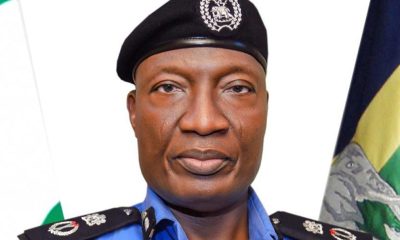
 Entertainment2 days ago
Entertainment2 days agoMystery in Lekki: Police Probe Death of Two Nollywood Crew Found Lifeless in Parked Car





